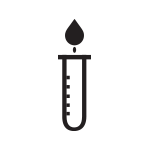With this service you will receive a home finger prick test. Our most comprehensive analysis of key hormones essential for men's health that influence male fertility and masculinity. Being deficient in these hormones can cause a lack of sexual desire, fatigue, mood swings, irritability, loss of muscle mass, reduced ability to exercise, fat redistribution, general lack of enthusiasm or energy, difficulty sleeping, and poor concentration.
Our male hormone tracker provides a comprehensive, thorough, extensive, and complete assessment of the key hormones in your body. This package is therefore a great tool to check whether your hormones are within a normal, healthy range. We test for an extensive panel of markers including follicle-stimulating hormone (FSH), sex hormone-binding globulin (SHBG), luteinizing hormone (LH), oestradiol, prolactin, and DHEA-s. Further to this, we complete a thorough evaluation of the levels of testosterone in the body, providing three different measures including the amounts of free testosterone, total testosterone, and the free androgen index (FAI). We also include a test for the protein albumin which helps us calculate FAI. In men, the amounts you have of all these analytes can have an impact on several traits such as your sex drive, levels of energy, sperm production, and muscle mass. Abnormal levels of these hormones could therefore lead to symptoms including loss of libido, erectile dysfunction or infertility.
Our test is perfect for those who:
Caution: Receiving hormones during hormone replacement therapy (HRT) will affect your results therefore, it is important to disclose this information to us so we can interpret your results much better.

We send you an easy-to-use kit to collect your blood sample.

Post your sample to our lab in the prepaid envelope provided.

View results securely in your own personal dashboard.
© 2023 All Right Reserved. Bio Healthcare Networks